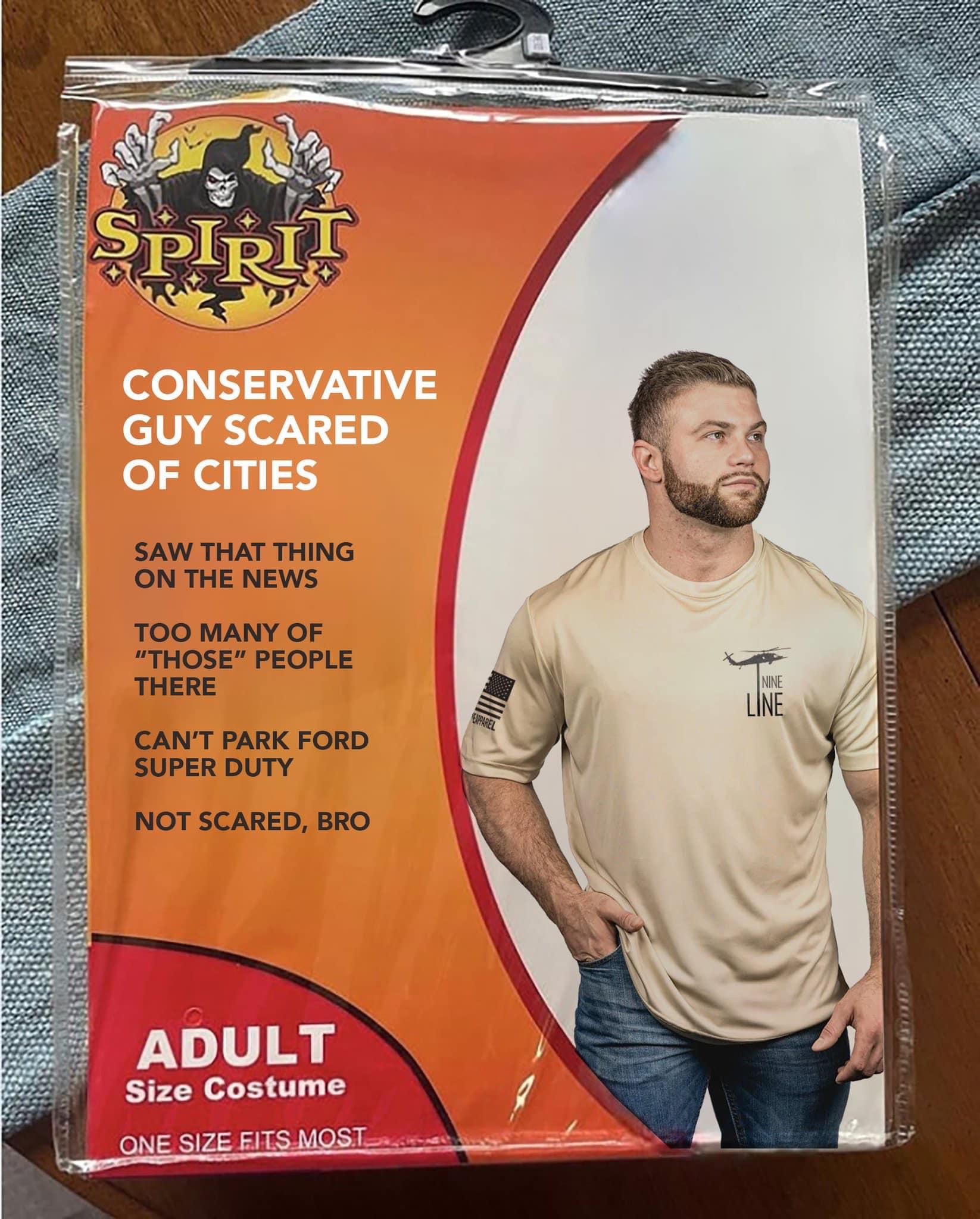The emergence of the “Conservative Guy Afraid of Cities” costume is a fascinating phenomenon that serves as a lens through which to explore contemporary societal attitudes toward urbanization, cultural identities, and the dynamics of viral media. This culturally relevant meme, which juxtaposes a character’s exaggerated fear of urban spaces against the backdrop of rapidly changing societal norms, affords a rich field for anthropological inquiry. This article intends to elucidate the costume’s implications from a cultural relativism perspective, examining various facets of the meme’s appeal, its reception, and its broader sociocultural significance.
To start, the meme encapsulates a caricatured representation of a conservative archetype—one who eschews metropolitan life in favor of rural or suburban environments. This portrayal resonates deeply with a segment of the population that harbors an aversion to the perceived chaos, diversity, and liberal attitudes often associated with urban centers. In exploring this phenomenon, one can differentiate between the meme’s humorous undertones and the serious societal fears that underlie its genesis.
At the core of this costume is the juxtaposition of rural conservatism against urban progressivism. The conservative figure, often depicted with anxiety-infused expressions, reflects a broader cultural anxiety that is prevalent among those who resist the perceived liberal hegemony championed by urban dwellers. Through this lens, the costume illustrates how humor can serve as a means of articulating discomfort with demographic and ideological shifts.
Moreover, the depiction of the conservative individual embodies key elements of class and cultural distinctions. Urban centers have become synonymous with cultural cosmopolitanism, where diversity is celebrated and alternative lifestyles are embraced. In this milieu, the conservative character’s trepidation emphasizes a longing for simplicity and tradition, rooted in familiar locales and familiar social orders. The character’s discomfort can thus be interpreted not merely as a phobia of urban environments, but as a manifestation of a nostalgic desire for a time when societal norms appeared more stable and predictable.
In examining the broader sociopolitical landscape, one sees that the “Conservative Guy Afraid of Cities” meme also serves as a critique of fast-evolving cultural norms. It is an expression of how certain populations may feel alienated by rapid changes, challenged by shifting paradigms surrounding gender, race, and social justice. Through comedic exaggeration, the meme offers its audience a tactical embrace of their anxieties while simultaneously normalizing feelings of isolation and skepticism toward urban spaces.
From an anthropological perspective, one may draw parallels between this meme and historical caricatures utilized in political discourse. The portrayal of the conservative individual reflects the age-old practice of using humor as a critical instrument to process and critique social realities. In this iteration, the meme acts as a cultural artifact that amplifies existing stereotypes while paradoxically engendering a discourse surrounding the validity of these fears.
The viral nature of this meme further elucidates the mechanisms through which cultural narratives propagate in the digital age. Social media has accelerated the meme’s reach, enabling vast audiences to engage with and reinterpret the imagery. Digital platforms serve not only as conduits for sharing content but also as arenas where diverse interpretations of cultural symbols can emerge. Consequently, the costume—while humorously representing one view—implicates broader questions about identity, belonging, and the clashing ideologies within contemporary society.
Furthermore, examining how different demographic groups engage with the meme reveals the multifaceted perceptions surrounding national identity and community belonging. For instance, urban dwellers may engage with the character in a spirit of ironic humor, viewing the costume as an opportunity to reflect on their own lifestyles and the compromises that accompany living in diverse communities. Alternatively, those identifying with conservative values may embrace the narrative as affirming their suspicions of urban environments, thereby reinforcing an in-group collective identity.
The meme also interweaves the themes of fear and societal change, linking back to the broader phenomenon of rural-urban migration. In recent decades, urban areas have attracted populations seeking better economic opportunities, leading to demographic shifts that can elicit feelings of unease among longstanding inhabitants. The “Conservative Guy Afraid of Cities” character crystallizes these tensions, highlighting how demographic change can invoke profound existential questions about community and cultural integrity.
In summation, the “Conservative Guy Afraid of Cities” costume encapsulates a significant cultural dialogue that traverses jokes, fears, and identity politics—an artifact of our time that resonates across a spectrum of societal values. From cultural relativism, this meme functions not merely as entertainment but as a prism through which to view the complexities of contemporary society’s evolving norms. By dissecting the cultural symbolism inherent in the meme, one uncovers the underlying anxieties reflective of a society grappling with the implications of urbanization amidst a landscape of shifting cultural identities. It stands as a testament to how humor, when dissected through an anthropological lens, reveals the intricate layers of meaning that bind us within the diverse tapestry of human experience.
